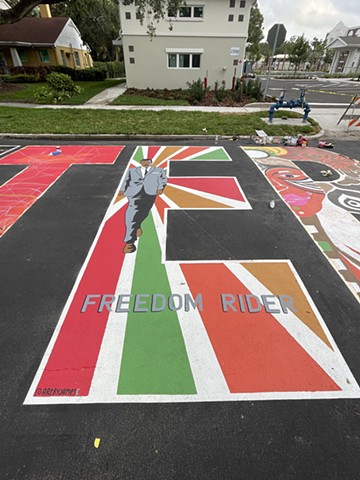Portfolio
Black History Matters Mural - Letter “E”
Located at the Carter G. Woodson Museum
Painted by James E. Hartzell on 6/17/2023
It has been an honor painting two different letters in separate mural projects at the Carter G. Woodson Museum in the last three years as a response to current events and human rights. The letter E is a tribute to civil rights icon Fred Shuttlesworth who was instrumental in organizing the Freedom Riders.
I learned about Shuttlesworth during a recent trip to Alabama and felt his story deserved to be elevated alongside the more well known activists of the era that were taught during my youth in public schools of Atlanta, GA. Shuttlesworth’s figure in the painting is surrounded by rays of color like a stained glass window, a reference to him being pastor of Bethel Baptist Church in Birmingham, AL.
Fred played a crucial role in organizing legal cases and participating in direct actions like sit-ins and protests against segregation in businesses, transportation, and schools. He was described as “fearless” and survived several murder attempts including the bombing of his house on Christmas morning with 16 sticks of dynamite in 1956. Fred was beaten by a mob of KKK in 1957 and his wife Ruby was stabbed after attempting to enroll their children in the public, all-white Phillips High School.
As a Jewish-American artist, I understand first hand how important teaching of the most uncomfortable chapters of history can be. How else can we learn from and not repeat the mistakes of the past?
Black history is being dramatically altered or erased from classrooms and curriculum due to banning of books and political meddling. Similar to the horrors of the Holocaust, the atrocities of slavery become real and relevant to students when they have more information to learn from not less. Documentation such as pictures, video or first hand accounts bring to life the trauma of these chapters in history and foster discussions about human rights and heritage.
We honor the past by addressing these wounds and celebrating the accomplishments of those who fought for change, not disguising or hiding them from the next generation.
